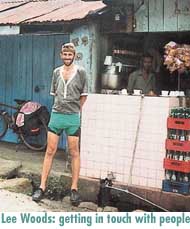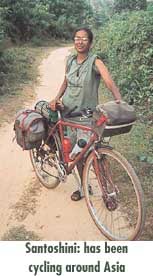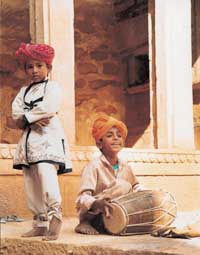 Is
morality just a sham? Is
morality just a sham?
My darling daughter,
It is so hot these days that I don't like to
stay in the room, the warm humid air makes me feel claustrophobic. Yesterday
I decided to sit on the verandah. It was yet early and I was happy to see
the number of young children dressed in white going to the temple opposite
the house, on the other side of the road another stream of youngsters were
going to Church for their religious classes.
I wondered, seeing their young thoughtful faces, and sighed for suddenly
a comment made by one of your young friends came into my mind. "lt
is not worth learning about why we should be good, when we hear and read
in the newspapers that those whom we should emulate are neither honest
or faithful to their promises. Morality is just a sham."
Really daughter have we not left you the young with any ideals? All
religions teach the same message of goodness and moral behaviour. There
is not much difference in the Ten Commandments or the Five Precepts. Each
religious teacher has exhorted that man be honest and truthful, and treats
his neighbour with respect and compassion. They have abhorred violence
and destruction, whether it was of self or to another and spoke of the
need for self discipline. But it appears today that all that they have
said and we have learnt in our youth has been offered at the altar of our
selfishness.
Regardless of whatever scandals we cause, or the consequences of
our actions so long as we attain our ambitions we are happy. I felt sad,
daughter for what a transitory goal we are chasing, even as those little
children offering flowers chant that life is limited, can we not be a bit
more disciplined to show the young that there is a greater value in our
lives than just achieving our worldly ambitions. I think it is time that
we realised it is not only necessary to teach the young the way they should
go, but we too must travel on the same road.
Our example is more valuable than all the lectures we ever could
give. I hope daughter that my life has been an example to you in that you
yet believe that the Five Precepts and the Ten Commandments are as relevant
today as they were in the years gone by.
- Ammi
Bharata Natyam from a German
German dancer Sonja Kleiner, will perform an 'Evening
of Bharata Natyam' at the Lionel Wendt on April 26. Her concert is presented
by the German Cultural Institute.
Born inWitten (Germany) Sonja came to Sri Lanka in 1992 and has been
studying Bharata Natyam under her teacher Haridevi Jayasundera at Kalalaya
School of Dance & Music ever since.
She was also successful at the Visharada Examinations conducted by the
Bhatkanda University, Lucknow. This is her second public performance after
her Arangetram in May, 1997.
"I set out for Sri Lanka in 1992, only a week after I had passed
my A-levels, curious, eager to learn and open to new experiences. Sri Lanka
made me feel at home from the beginning, but my plans of doing voluntary
work did not materialize. By chance I met my dance teacher Mrs. Haridevi
Jayasundera and I started studying under her for a "trial period"
of two weeks. I wanted to learn more about the culture of this part of
the world, I wanted to "get involved" - and got involved more
than I had ever expected to," says Sonja.
"After the first few weeks of studying dance I realized that this
was what I "really want to do". I became more and more fascinated
and finally I developed the courage to fully commit myself to studying
Bharata Natyam. There seems to be no end to learning this art, it embraces
equally body and mind. It is through dance that I have developed a new
approach to Eastern philosophy and I feel I have come closer to my inner
self."Sonja Kleiner is a young artiste who has devoted her life to
Bharata Natyam. Despite its roots in South India, Bharata Natyam has become
an international dance performed in every part of the world by Indians
and non-Indians alike. It is now a part of world heritage and belongs to
everyone who loves beauty, art and the joy of movement. Scholars say that
Bharata Natyam is a composite art. It is a sensuous dance involving the
art of the stage, drama, music, poetry, colour and rhythm. And yet it is
not only a dance of external enjoyment, writes Dr. Radhika Coomaraswamy.
Cycling around Sri Lanka
Lee Woods and Santoshini Perera live in London.
Both have cycled across continents for months at a time. Recently, in Colombo,
the pair met with Tharuka Dissanaike.
 Lee
Woods and Santoshini Perera share a common love - cycling tours. They believe
there is no better way to see a country, than peddling a two wheel. Huffing
up steep mountain roads or winding through village pathways, on the back
of a bicycle this duo is at home, even in the most foreign of lands. Lee
Woods and Santoshini Perera share a common love - cycling tours. They believe
there is no better way to see a country, than peddling a two wheel. Huffing
up steep mountain roads or winding through village pathways, on the back
of a bicycle this duo is at home, even in the most foreign of lands.
Lee and Santhoshini had just completed a two week tour of Sri Lanka-
cycling, of course- when we met them last week. "When you are on a
cycling tour, you see the best of a country," Santoshni said. 'And
the worst.'
The worst came when Lee was nearly run over by an Intercity Express
bus. The best, of course, was exploring the countryside on their route
which spanned the southern coast and a part of the hill country. Being
on bicycles also allow them to travel on roads less travelled and visit
places less known to normal tourists.
Their route took them from Colombo to Matugama, to Galle, from there
along the coast to Koggala, Matara, Tangalle, then through Mulkirigala
to Embilipitiya. From there on the old Kelani Valley route to Balangoda,
and Haputale. Through the Boralanda road to Horton Plains to Nuwara Eliya
to Hatton, where the couple climbed to the summit of Sri Pada and returned
to Colombo via Kitulgala. "The  worst
was the last stretch, from Homagama to Colombo- the fumes and the traffic!" worst
was the last stretch, from Homagama to Colombo- the fumes and the traffic!"
They camped in only one place, at a Raja Maha Vihare in Kolumbege Ara.
When they do camp, they make sure that no litter is left behind. "No
one can even tell that we have been there."
Lee and Santoshini are both experienced in this mode of travel. Six
years ago Lee had cycled across Africa, from Tunisia to Tanzania. It took
him one and a half years and for most part of the journey he had travelled
alone. Santoshini cycled around Asia and Australia in six months back in
1995.
"On a bicycle you are more on level with ordinary people on the
roads," Lee says. "I love to stop by road side boutiques and
chat up people as they go about their day to day lives."
"When you are on a bicycle, there is no avoiding people,"
he said. "You have to learn to communicate, because you need certain
things- water, for instance or a place to spend the night."
"It is not like a sport," Santoshini said. "It's much
more all round. You need to know how to interact with people, how to protect
yourself and survive. On a bicycle, all alone, you are quite vulnerable.
It's a different culture."
For both, the interaction with people in rural countryside is as exhilarating
as cycling down mountain slopes. "People have such preconceived ideas
about who you are and what you want," Lee said. When Lee goes into
a wayside tea 'kade' asking for something to drink, they offer him Fanta
or Pepsi. "I'd much rather have a papaw juice." But, he said,
villagers think that to cater to tourists they need posh, steel and chrome
outlets with fancy gadgets. His idea is that more Sri Lankans could cash
in on the tourism industry by simply being a little more innovative.
"By talking and interacting with ordinary folk, you manage to break
down some of the illusions created in their minds about white people,"
Lee said.
For Lee and Santoshini conventional tourism is a no-no. "Normally
tourists are taken on buses from A to B and there is little chance of experiencing
what is in between."
Their pleasure lies in discovering the 'in between' and they avoid the
normal tourist locations where crowds and development spoil the actual
attraction.
Returning from their tour, the couple is full of concern for the problems
of pollution and garbage in the country. "You have a beautiful country,"
Lee said. "But every town appears to have a problem with garbage."
"We saw all the garbage thrown up Sri Pada. It was terrible. Why
can't there be an effort to clean up the path? People just need to be educated
not to litter."
Self proclaimed nature buffs , both Lee and Santoshini feel strongly
about interfering with the environment.
Most countries are now gearing towards eco-friendly tourism.
Big hotels and large tour buses are giving way to thatch-roofs and local
culture. This new concept advocates travel that results in minimum impact
and damage to the surroundings.
Cycling is the most environment-friendly mode of travel- for Lee and
Santoshini there's no debate. Not only do they leave minimal pollution
in their wake, but "on a bike your awareness of nature is heightened,
because you are in the thick of it. You would not think of polluting. That
will be like cutting the branch you're sitting on."
More Mirror Magazine * Is he gay? * Rajasthan
through a lens

Mirror Magazine Archive
Front Page| News/Comment|
Editorial/Opinion| Business|
Plus |Sports
|









